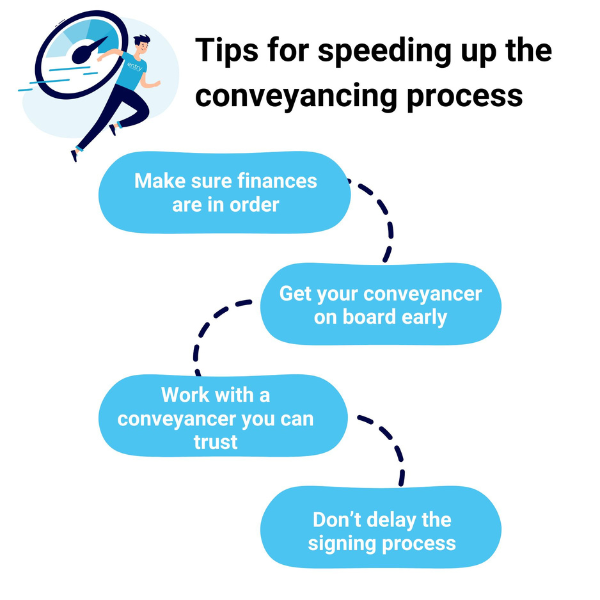If you’re in the midst of buying or selling property, you’re no stranger to what a conveyancer is and what the conveyancing process might look like. However, one thing that can be distinctly different in every purchasing process is the timeline. So, how long does conveyancing generally take?
Once you have found a buyer or seller who is willing to proceed with a property transaction, there are still several required steps that need to be fulfilled before the transaction can be finalised with the official transfer of the property title.
These steps are covered under the process of conveyancing and are a requirement for every property transaction. The timeline for conveyancing is dependent on several factors, but it typically takes an estimated 4-6 weeks to be completed following the exchange of contracts.
How long does settlement take?
Settlement is the final step of the conveyancing process and is only carried out after all details and necessary deliverables have been prepared for the property transaction, which is usually after a period of six weeks. A settlement date is agreed upon at the exchange of contracts, which is when the settlement of the transaction will occur (payment to the seller, transfer of property to the buyer).
What can impact the timeline for conveyancing?
The estimated conveyancing timeline of 4-6 weeks is a general guide, and it is possible for conveyancing to take even longer than this period. The sort of things that can impact conveyancing timelines include:
Communication
Slow (or a lack of) communication between transactional parties is one of the main hold ups for conveyancing. Buyers, sellers, and conveyancers are all part of the process, and slow responses from any party will result in a lengthening of the conveyancing process. Buyers or sellers often have questions or requests for information about the property and terms of sale, and the sooner answers can be provided by the relevant party, the quicker the conveyancers can relay it to them and continue processing the transaction.
The contract
The contract is another big part of the conveyancing process. The drafting and negotiation of the contract of sale can take time, especially if there are complex terms or if there are disagreements between the buyer and seller that need to be resolved.
Settlement delays
In the days leading up to settlement, buyers and sellers will be expected to prepare the necessary documentation to facilitate a successful transaction. However, issues with obtaining certain documents or disputes over property titles can arise, leading to delays in the settlement process.
In such cases, the previously agreed on settlement date may need to be postponed to allow for the gathering of all the required documents leading to a longer conveyancing time period.
Finance delays
Buyers are expected to have the finances for a deposit and a formal offer for a mortgage (if they need to obtain one). Conveyancers will often ensure that buyers have at least obtained pre-approval for the necessary finances in advance, but in some cases, complications with mortgage applications or a change in the buyer’s financial circumstances can result in further delays in the conveyancing process.
Signing delays
Delays in signing the required documents can also prolong the conveyancing timeline. These signing delays can arise due to various reasons such as scheduling conflicts, travel issues, or disputes regarding the terms of sale outlined in the contract.
Without both parties signing their respective contract, the transaction will not be able to proceed toward settlement and as a result, will experience delays.
Tips for speeding up the conveyancing process:
In order to ensure a smooth and speedy conveyancing process, there are a number of variables that buyers and sellers can take action on:
- make sure finances are in order – Gaining pre-approval will remove most of the guesswork from the equation and provide more assurance that you will have the finances to proceed with the property transaction.
- get your conveyancer on board early – Choosing to engage a conveyancer at the very beginning of the sale consideration process can significantly speed up the time taken for conveyancing. A conveyancer will be able to help you prepare all of the required documents and action items needed on your end of the transaction to prevent future delays.
- work with a conveyancer you can trust – When choosing a conveyancer to work with, make sure that they have the necessary experience and expertise to guide you throughout the process. This is especially true if you’re new to buying or selling a house — you’ll need to rely on a conveyancer you can trust to provide the support you need.
- don’t delay the signing process – Act quickly, especially when it comes to signing the contract. You should still conduct your due diligence and ensure that all the terms are agreeable, but once you are satisfied with the terms, sign it. Without signing it, the transaction isn’t confirmed, and the other party could very well cancel the deal if they end up having to wait too long.
Your trusted conveyancers in Victoria & New South Wales
The conveyancing process can be complicated and difficult to navigate alone, which is why most buyers and sellers choose to work with our trusted conveyancers in Sydney, Melbourne, and across Australia. At Entry Conveyancing, our services are aimed at helping you transaction proceed as smoothly as possible to ensure a favourable outcome. Contact us today to find out how we can help you buy or sell your desired property.






